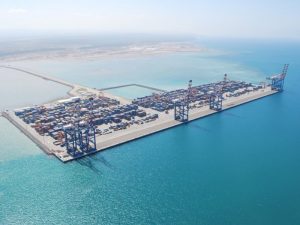Broadband wireless access leader’s network is robust, reliable and secure
Inaugurated in December 2008, Djibouti’s Doraleh Container Terminal (DCT) is the most technologically advanced container terminal and the second largest (by capacity) on the African continent.
The most significant characteristics of this port include a 1.6 million twenty-foot equivalent unit (or TEU) cargo handling capacity, more than 1000 meters of quay length, 8 Super Post Panamax quay cranes with twin lift capacity and 18 meters draught, allowing the port to accommodate the latest generation of cargo vessels.

As the hub for the region, DCT is required to manage container inventories, conduct inspections and load and unload ships quickly, efficiently and safely, key operations that can have a significant impact on the port’s bottom line.
To conduct these operations, DCT personnel use a series of hand-held terminals (HHTs) and vehicle-mounted terminals (VMTs) to communicate with each other and with the DCT central control room. The HHTs are used by the inspection team to conduct random checks of containers, and by the dispatch team to ensure that containers are either sent to the right storage location or loaded onto the correct vessel.
Similarly, as their name suggests, the VMTs are mounted on the handling equipment (cranes, reachstakers, trucks) and provide the driver with instructions on where to pick-up or drop-off containers.
Technology tops
According to Abdourahman Houssein, IT Manager, DCT, real-time data transmission is vital to the Port’s operations, particularly during peak hours when it is operating at full capacity.
Unfortunately, DCT’s legacy network had a bandwidth limitation of less than 50kbps, which severely impacted its personnel’s ability to conduct basic operations efficiently and effectively.
For example, there were several instances where it would take up to about 10-15 seconds for data on the HHTs and VMTs to get updated.
The legacy network also posed two other significant challenges. For one, its low bandwidth meant that the network could not support voice, video and business applications.
Its inability to support video streams meant that the port could not deploy a 24/7 security surveillance system – a must-have for any modern day port. On the ground, the port employees were also not able to use the mobile functionality of business applications.
Secondly, the network architecture precluded a connection between the port itself and its two remote offices. For this, DCT once again used the local operator’s network, which resulted in a low bandwidth, unreliable and extremely expensive ad-hoc solution.
Djibouti—Regional Logistics Hub
As a cornerstone of the Djibouti economy and a lifeline to neighbouring landlocked Ethiopia, it was clear to the DCT management team that they needed to upgrade their network infrastructure as a matter of very high priority. Therefore, a dedicated railway line was constructed to transport goods safely and quickly between Ethiopia and DCT.
Tasked with this challenging undertaking, the DCT management enlisted the services of E2E, one of the region’s leading system integrators for the telecommunications industry.
After a through site survey, the E2E field manager realized that a pure WiFi solution would not be able to support all the port requirements that included data for the HHTs and VMTs, voice, video for remote surveillance and backup for the fiber connecting all onsite offices.
Strategic Partner for Future Growth
In operation since December 2017, the InfiNet Wireless network has far exceeded DCT’s expectations and the requirements detailed in the initial RFP.
“This additional bandwidth has also allowed us to extend coverage for voice and data to our Quay cranes which is not only a major bonus for our operational efficiency but also allows us to significantly reduce costs associated with voice telephony over legacy mobile network,” explained Houssein.
“With InfiNet Wireless now at the core of our operations, I am confident that we will be able to deliver our aggressive growth plans and firmly establish ourselves as one of the key ports-of-call in Africa,” concluded Houssein.
